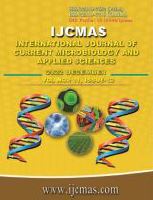


 National Academy of Agricultural Sciences (NAAS)
National Academy of Agricultural Sciences (NAAS)

|
PRINT ISSN : 2319-7692
Online ISSN : 2319-7706 Issues : 12 per year Publisher : Excellent Publishers Email : editorijcmas@gmail.com / submit@ijcmas.com Editor-in-chief: Dr.M.Prakash Index Copernicus ICV 2018: 95.39 NAAS RATING 2020: 5.38 |
Improving dairy cow fertility by means of genetic selection is likely to become increasingly important, since it is now well established that declining fertility cannot only be arrested by improved management. Fertility is a major concern in the dairy cattle industry and has been the subject of numerous studies over the past 20 years. Surprisingly, most of these studies focused on rough female phenotypes and, despite their important role in reproductive success, male- and embryo-related traits have been poorly investigated. In recent years, the rapid and important evolution of technologies in genetic research has led to the development of genomic selection. genomic selection (GS) is a form of marker-assisted selection in which genetic markers covering the whole genome are used so that all quantitative trait loci (QTL) are in linkage disequilibrium with at least one marker. GS can increase the accuracy of selection, shorten the generation interval by selecting individuals at the early stage of life, and accelerate genetic progress. With the availability of high density whole genome SNP (single nucleotide polymorphism) chips for livestock, GS is reshaping the conventional animal breeding systems. In many countries, GS is becoming the major genetic evaluation method for bull selection in dairy cattle and GS may soon completely replace the traditional genetic evaluation system. In recent years, GS has become an important research topic in animal, plant and aquiculture breeding and many exciting results have been reported.
 |
 |
 |
 |
 |